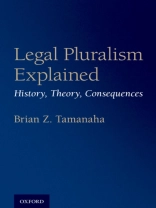Legal pluralism involves the coexistence of multiple forms of law. This involves state law, international law, transnational law, customary law, religious law, indigenous law, and the law of distinct ethnic or cultural communities. Legal pluralism is a subject of discussion today in legal anthropology, legal sociology, legal history, postcolonial legal studies, women’s rights and human rights, comparative law, international law, transnational law, European Union law, jurisprudence, and law and development scholarship. A great deal of confusion and theoretical disagreement surrounds discussions of legal pluralismwhich this book aims to clarify and help resolve. Drawing on historical and contemporary studiesincluding the Medieval period, the Ottoman Empire, postcolonial societies, Native peoples, Jewish and Islamic law, Western state legal systems, transnational law, as well as othersit shows that the dominant image of the state with a unified legal system exercising a monopoly over law is, and has always been, false and misleading. State legal systems are internally pluralistic in various ways and multiple manifestations of law coexist in every society. This book explains the underlying reasons for and sources of legal pluralism, identifies its various consequences, uncovers its conceptual and normative implications, and resolves current theoretical disputes in ways that are useful for social scientists, theorists, jurists, and law and development scholars and practitioners.
Brian Z. Tamanaha
Legal Pluralism Explained [PDF ebook]
History, Theory, Consequences
Legal Pluralism Explained [PDF ebook]
History, Theory, Consequences
Mua cuốn sách điện tử này và nhận thêm 1 cuốn MIỄN PHÍ!
Ngôn ngữ Anh ● định dạng PDF ● Trang 208 ● ISBN 9780190861575 ● Nhà xuất bản Oxford University Press ● Được phát hành 2021 ● Có thể tải xuống 3 lần ● Tiền tệ EUR ● TÔI 8039654 ● Sao chép bảo vệ Adobe DRM
Yêu cầu trình đọc ebook có khả năng DRM












